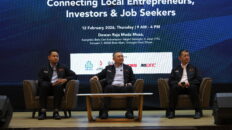KUALA LUMPUR, 14 April 2025 – The Associated Chinese Chambers of Commerce and Industry of Malaysia (ACCCIM) today released findings from its latest Quick Take Survey (QTS), conducted between 7–10 April 2025, to assess the impact of newly imposed US reciprocal tariffs on Malaysian businesses. The survey, which garnered 192 responses, provides crucial insights into business preparedness, anticipated financial effects, and strategic responses.
Significant Impact on Malaysian Exporters and SMEs
The survey revealed that 55.2% of respondents expect direct and indirect impacts from the tariffs, with nearly 60.4% expressing pessimism about their business prospects moving forward.
Among exporters surveyed, more than half reported having exposure to the US market, with 63.2% deriving over 20% of their sales from the US. Other top export destinations include ASEAN (58.3%), Europe (34.0%), Middle East (33.0%), and China (20.4%).
When faced with tariff hikes exceeding 10%, 61.3% of businesses said they anticipate reduced sales, while 31.1% believe their products would lose price competitiveness in the global market. Businesses noted that the price elasticity of demand and the availability of substitutes could exacerbate the impact.
Furthermore, 46.2% of businesses reported pressure from customers to reduce prices to offset the tariffs, while others are attempting to share tariff burdens with loyal buyers, significantly squeezing profit margins.
Adaptive Strategies and Mitigation Plans
Despite challenges, businesses are actively strategizing:
- 91.5% have plans to mitigate tariff impacts
- 60% are focusing on operational cost reductions
- 56.7% plan to diversify into new markets
- 35.1% are sourcing from alternative suppliers
- 42.3% are deferring or cancelling investment plans
Some businesses are also preparing to pass on increased costs to consumers, highlighting a potential inflationary ripple effect.
Call for Government Intervention and Support
ACCCIM urges the Malaysian Government to roll out targeted assistance for affected businesses, especially SMEs, including:
- Financial aid such as grants, subsidies, and tax relief
- Emergency relief funds with low-interest loans and loan restructuring (akin to the Special Relief Facility)
- A centralised information unit offering real-time updates and guidance on tariff-related regulations
- Trade agency collaboration with chambers and associations to aid in market diversification, supply chain optimisation, and promotion of domestic products
The chamber also recommends enhancing the Market Development Grant (MDG) to empower exporters in expanding Malaysian brands globally.
Tariff Pause Offers Temporary Relief – But Uncertainty Remains
ACCCIM President Datuk Ng Yih Pyng emphasised that while Malaysia currently faces a universal 10% tariff and a 90-day pause for trade negotiations, the lack of clarity until July 2025 creates substantial uncertainty for businesses.
He expressed hope that Malaysia’s diplomatic efforts will result in a balanced and mutually beneficial trade resolution with the US, given the long-standing bilateral trade and investment ties.
To support these efforts, ACCCIM has formed a dedicated task force to collect industry feedback and work with the Government to shape responsive strategies that shield businesses from prolonged disruption.
Preserving Business Confidence Amid Domestic Cost Pressures
Datuk Ng also called on the Government to delay domestic policy changes that may amplify cost pressures, including:
- Expansion of Sales and Services Tax (SST)
- RON95 fuel subsidy rationalisation
- Proposed electricity tariff hikes
- Multi-tiered foreign worker levies
He further suggested that Bank Negara Malaysia consider lowering interest rates should the trade war escalation begin to erode domestic demand.
“In this uncertain global environment, we must prioritise business confidence and economic resilience. We urge for a coordinated policy response that balances trade diplomacy with domestic business support,” Datuk Ng concluded.








